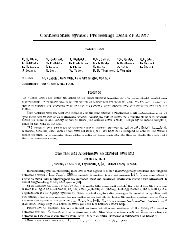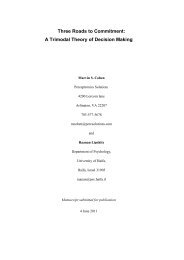Three Roads to Commitment: A Trimodal Theory of Decision Making
Three Roads to Commitment: A Trimodal Theory of Decision Making
Three Roads to Commitment: A Trimodal Theory of Decision Making
You also want an ePaper? Increase the reach of your titles
YUMPU automatically turns print PDFs into web optimized ePapers that Google loves.
<strong>Three</strong> <strong>Roads</strong> <strong>to</strong> <strong>Commitment</strong>: A <strong>Trimodal</strong> <strong>Theory</strong> <strong>of</strong> <strong>Decision</strong> <strong>Making</strong> 55<br />
University Press.<br />
Fiske, A. P., & Tetlock, P. E. (1997). Taboo trade<strong>of</strong>fs: Reactions <strong>to</strong> transactions that transgress the spheres <strong>of</strong><br />
justice. Political Psychology, 18(2), 255-297.<br />
Garud, R. & Karnoe, P. 2001, Path Dependence and Creation, Erlbaum, Mahwah NJ.<br />
Gentner, D., Holyoak, K. J., & Kokinov, B. N. (Eds.). (2001). The analogical mind: Perspectives from cognitive<br />
science. Cambridge MA: M.I.T. Press.<br />
Gibbard, A. (1990). Wise choices, apt feelings: A theory <strong>of</strong> normative judgment. Cambridge, MA: Harvard<br />
University Press.<br />
Gibson, J. J. (1979). The Ecological Approach <strong>to</strong> Visual Perception. Bos<strong>to</strong>n: Hough<strong>to</strong>n Mifflin.<br />
Gilovich, T., Griffin, D., & Kahneman, D. (Eds.). (2002). Heuristics and biases: The psychology <strong>of</strong> intuitive<br />
judgment. Cambridge, UK: Cambridge University Press.<br />
Gigerenzer, G., H<strong>of</strong>frage, U., & Kleinbolting, H. (1991). Probabilistic mental models: A Brunswickian theory <strong>of</strong><br />
confidence. Psychological Review, 98(4), 506-528.<br />
Gigerenzer, G., & Selten, R. (2001). Bounded rationality: The adaptive <strong>to</strong>olbox. Cambridge MA: MIT Press.<br />
Gigerenzer, G. (2000). Adaptive thinking: Reasoning in the real world. Oxford: Oxford University Press.<br />
Gigerenzer, G., & Goldstein, D. G. (1996). Reasoning the fast and frugal way: Models <strong>of</strong> bounded rationality.<br />
Psychological Review, 103(4), 650-669.<br />
Gigerenzer, G., Todd, P. M., & Group, A. R. (1999). Simple Heuristics that Make Us Smart. Oxford: Oxford<br />
University.<br />
Gilbert, M. (1996). Living Together: Rationality, Sociality, and Obligation. Lanham MA: Rowman & Littlefield.<br />
Ginges, J., Atran, S., Medin, D. L., & Shikaki, K. (2007). Sacred bounds on rational resolution <strong>of</strong> violent political<br />
conflict, from www.pnas.org/cgi/doi/10.1073/pnas.0701768104.<br />
Gillies, D. (2000). Philosophical Theories <strong>of</strong> Probability. New York: Routledge.<br />
Gilovich, T., Griffin, D., & Kahneman, D. (Eds.). (2002). Heuristics and biases: The psychology <strong>of</strong> intuitive<br />
judgment. Cambridge, UK: Cambridge University Press.<br />
Goldstein, D. G. (2001). Group Report: Why and when do simple heuristics work. In G. Gigerenzer & R. Selten<br />
(Eds.), Bounded rationality: The adaptive <strong>to</strong>olbox (pp. 173-90). Cambridge MA: MIT Press.<br />
Goodman, N. (1965). Fact, fiction, and forecast. Indianapolis: The Bobbs-Merrill Company.<br />
Goschke, T., & Kuhl, J. (1996). Remembering what <strong>to</strong> do: Explicit and implicit memory for intentions. In M.




